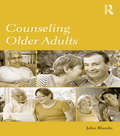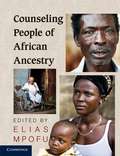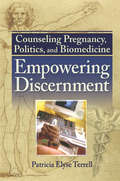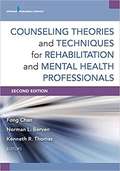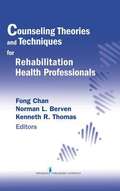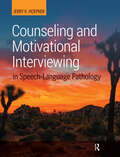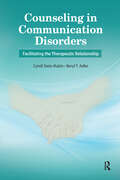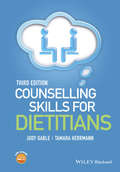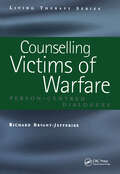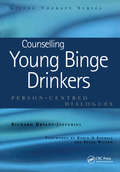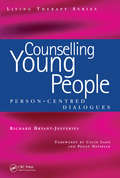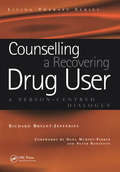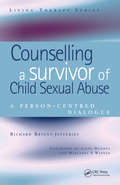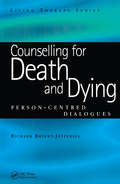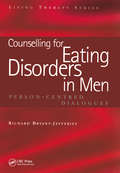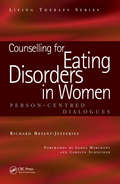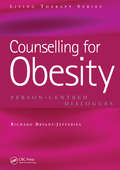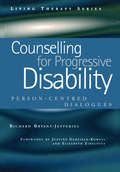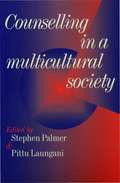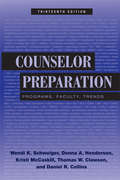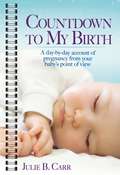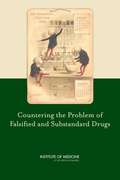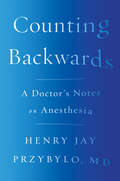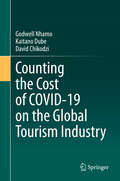- Table View
- List View
Counseling Older Adults
by John BlandoCounseling older adults is not equivalent to counseling the general population, and specialized skills and knowledge, as well as sensitivity to the contexts in which older adults live, are essential in working successfully with this population. This text provides an introduction to gerontological counseling, integrating the basic skills of working with older adults with theories of counseling and aging. Specific counseling issues discussed include mental health counseling, career counseling, rehabilitation counseling, and family counseling. Along with these, important contextual factors such as race/culture, social class, social justice, spirituality, Alzheimer’s and other dementias, and family issues are considered in light of the latest research. Each chapter contains case studies, discussion questions, a glossary, and suggestions for further reading to reinforce the material presented.
Counseling People of African Ancestry
by Elias MpofuThis volume advances a uniquely Afro-centric, sociocultural understanding of health maintenance and risk reduction in African cultural heritage populations. It unites a diverse group of leading African and Africanist scholars in an exploration of common cultural values in African heritage communities and their practical applications in contemporary counseling. The chapters highlight the prominent health issues faced in Africanist settings today and use real-world experiences to illustrate core lessons for effective community action. The approach spans complex cultural milieus, from diversity counseling to conflict resolution. Each chapter includes field-based experiential tasks, discussion boxes, research boxes and case studies, which serve as valuable resources in both coursework and casework. Counseling People of African Ancestry is an essential primer for community health workers, counselors and educators seeking a better understanding of African cultural heritage settings to promote community health, well-being and development.
Counseling Pregnancy, Politics, and Biomedicine: Empowering Discernment
by Patricia Elyse TerrellExamine the impact and importance reproduction and genetics have on religious valuesCounseling Pregnancy, Politics, and Biomedicine: Empowering Discernment explains the mystery of the God-human relationship so ministers, priests, and pastors can follow the ethics and mechanics of counseling human reproductive health and be informed on issues of religion, medical experimentation, and politics. The unique book is a teaching text and a desktop reference for clergypersons and pastoral care ministers, providing them with information on the sensitive and intimate topic of reproductive health from a Christian worldview so they can advise and empower congregation members to make thoughtful decisions about health care. Counseling Pregnancy, Politics, and Biomedicine examines four disciplines through a Christian point of view: 1) religion based on humanity created in the image of God; 2) different varieties of ethics; 3) systems of law and politics; and 4) philosophies on experimental medicines. Each topic is grounded with its religious background, providing a practical, easy-to-follow path for Christian thinkers. The book also addresses the concerns a religious person might have about health and ministry, what genetic therapy can accomplish, the alternatives to genetic therapy, and how theology, ethics, law, and medicine apply to the issues expectant mothers face.Counseling Pregnancy, Politics, and Biomedicine examines: the major points in recognized ethical theories how Christian principles became part of secular law over time the legal dilemmas involved in protecting the health of pregnant women how and why palliative care is a viable alternative to modern therapies the politics and morality of terminating a pregnancy how to protect women from becoming research "instruments" the moral status of the embryo and much moreCounseling Pregnancy, Politics, and Biomedicine explains God&’s desire for good health by identifying ways in which Jesus is the example of what it means for every person to be "created in the image of God." The book is a vital resource for clergypersons and pastoral care ministers.
Counseling Theories And Techniques For Rehabilitation And Mental Health Professionals
by Fong ChanThe only text about counseling theories and techniques developed specifically for upper-level rehabilitation counseling students and practitioners, this book is now fully updated with a focus on evidence-based practice. It reflects the great strides made in incorporating research-based knowledge into counseling/therapy interventions since the first edition's publication nearly 10 years ago. The book disseminates the expertise of many of the most esteemed leaders and academic scholars in rehabilitation counseling. These authors emphasize state-of-the-art scientific evidence that supports the effectiveness of various counseling approaches and techniques for people with and without disabilities. New topics include evidence-based practice related to counseling/psychotherapy and motivational interviewing. Methodologies include person-centered counseling, solution-focused brief therapy, gestalt therapy, cognitive and behavioral therapies, psychodynamic therapy, and an Adlerian approach. The book describes basic counseling skills for rehabilitation, including motivational interviewing, group procedures, family counseling, and career and vocational counseling. Also addressed are counseling for individuals with substance abuse disorders, physical disabilities, psychiatric disabilities, and multicultural issues in counseling. Additionally, the book covers such professional issues as supervision in rehabilitation settings and managing risk. Case studies highlight the application of theories and techniques, and each chapter also includes learning objectives and discussion exercises. Accompanying ancillaries include an instructor's manual containing a sample syllabus, an item bank for developing quizzes and exams, and classroom exercises, and PowerPoint presentations for each chapter. The text also serves as a valuable reference for rehabilitation and related health professions such as nursing, occupational therapy, physical therapy, speech and language therapy, and social work.
Counseling Theories and Techniques for Rehabilitation Health Professionals
by Fong Chan Norman L. Berven Kenneth R. ThomasForty-three American academics and practitioners discuss the dominant theories and techniques of counseling and psychotherapy from a rehabilitation perspective. Coverage includes reviews of ten psychodynamic, humanistic, and cognitive and behavioral approaches to counseling; basic techniques; considerations for specific types of disabilities; and professional issues. Each chapter includes a case example. Annotation ©2004 Book News, Inc., Portland, OR (booknews.com)
Counseling Theories and Techniques for Rehabilitation Health Professionals
by Fong Chan Norman L. Berven Kenneth R. ThomasForty-three American academics and practitioners discuss the dominant theories and techniques of counseling and psychotherapy from a rehabilitation perspective. Coverage includes reviews of ten psychodynamic, humanistic, and cognitive and behavioral approaches to counseling; basic techniques; considerations for specific types of disabilities; and professional issues. Each chapter includes a case example.
Counseling and Motivational Interviewing in Speech-Language Pathology
by Jerry HoepnerWritten as a helpful guide for speech-language pathologists and students, Counseling and Motivational Interviewing in Speech-Language Pathology provides a solid base in theoretical foundations, while prioritizing skill development and practical applications of counseling in speech-language pathology. Now more than ever, there is a burgeoning need for speech-language pathologists to incorporate counseling into their everyday practice. However, most practitioners currently lack the training and knowledge necessary to fulfill that role. Counseling and Motivational Interviewing in Speech-Language Pathology seeks to remedy that by providing techniques and tools for counseling across the lifespan and practice settings. The book is divided into two main parts: • Chapters 1 through 4 cover the foundational principles of motivational interviewing, including several self-assessment tools to support learners in the process. • Chapters 5 through 8 address specific counseling techniques and topics, providing readers with practical examples of how to properly counsel individuals with communication, cognition, and swallowing disorders. What’s included in Counseling and Motivational Interviewing in Speech-Language Pathology: • Sample dialogues between clinicians and clients. • Case examples, thinking exercises, and potential assignments for readers to apply the knowledge and skills addressed in the book. • A chapter dedicated to communicatively accessible structured interview approaches, eliciting and monitoring collaborative goals, and screening for other mental health concerns.Counseling and Motivational Interviewing in Speech-Language Pathology is an approachable guide that will address the issues of scope of practice while proving why speech-language pathologists are uniquely suited to provide counseling.
Counseling in Communication Disorders: Facilitating the Therapeutic Relationship
by Cyndi Stein-Rubin Beryl AdlerIncorporating a counseling paradigm has been shown to increase motivation, deepen learning, and sustain progress for clients and families. Counseling in Communication Disorders: Facilitating the Therapeutic Relationship by Cyndi Stein-Rubin and Beryl T. Adler, is an engaging textbook, written in a genuine and lively tone, so that the reader may easily relate to the material. The text provides a practical vehicle for speech-language pathology students, clinicians, clinical supervisors, and instructors to get to know themselves better and to integrate basic counseling attitudes and tools into their diagnostic and therapeutic programs. Inside Counseling in Communication Disorders, Stein-Rubin and Adler describe the importance of addressing a client’s communication challenges by working with the whole person, as a human being, not as a communication disorder. By approaching clients with a counseling attitude that encourages the client’s full participation in the treatment process, we then work together in partnership and as a powerful team. The content, techniques, and exercises within Counseling in Communication Disorders are rooted in evidence-based practice from a variety of psychological, counseling, and coaching approaches, such as Humanistic Counseling, Listening and Language, Narrative Therapy, The Cognitive Behavioral Model (CBT), Solution-Focused Brief Therapy (SFBT), Positive Psychology, Neurolinguistic Programming (NLP), and Mindfulness training.Counseling in Communication Disorders also includes reflective questions, exercises, and suggestions to reinforce important concepts. To bring the content to life, real-life and clinical scenarios are interspersed throughout the text.It is well understood that speech-language pathology and audiology clinicians must understand deep listening and how to choose words that will have a positive impact on their client and families, but often overlooked is the personal development of the clinicians themselves. Counseling in Communication Disorders is a comprehensive guide on how to provide the necessary support and encouragement to clients and build self-esteem, while a major focus is the need for the clinicians to work on self before working on other. Counseling in Communication Disorders: Facilitating the Therapeutic Relationship is the first textbook of its kind to comprehensively cover both sides of the therapeutic relationship. Students and clinicians alike will appreciate this unique approach that addresses not only the counseling attitude that is vital to the growth and progress of clients, but also the self-awareness that guides the personal development of the clinician.Included with the text are online supplemental materials for faculty use in the classroom.
Counselling Skills for Dietitians
by Judy Gable Tamara HerrmannThe third edition Counselling Skills for Dieticians has been fully revised and updated to reflect the recent developments, research and interests in the field. It explores the skills required for dietetic counselling, and includes frequent examples of dialogue from patient consultations, as well as exercises and activities so that the reader can undergo experiential learning relevant to their practice. Includes examples from daily practice to illustrate the difficulties encountered by dietitians and demonstrate the application of counselling skills Clearly explains theoretical models of accepted counselling practice underpinning the skills described Has been updated to include additional information on topics such as assertiveness skills and eating distress Addresses practical and psychological issues faced by dietitians and patients Now provides access to a range of supportive online material including videos of consultations, case studies and resources for trainers
Counselling Victims of Warfare: Person-Centred Dialogues (Living Therapies Series)
by Richard Bryant-JefferiesIn the United Kingdom since 1987 38,000 people have been referred to The Medical Foundation for specialist psychological treatment relating to warfare, and in the past 80 years 75,000 military personnel have received counselling from the Ex-Services Mental Welfare Society. The topic of warfare induced psychological stress and trauma is a vast one. This book gives an unique, person-centred insight into counselling victims of warfare (either civilians or military personnel) whose trauma is physical or psychological. It covers such topics as anger, death, nightmares, recovered memories, emotional and physical pain, and alcohol use. It also contains a list of useful contacts for further support and helpful tips. Counsellors, trainees and other healthcare and social care professionals dealing with civilian or military victims of warfare will find this guide invaluable.
Counselling Young Binge Drinkers: Person-Centred Dialogues (Living Therapies Series)
by Richard Bryant-JefferiesYoung binge drinkers are becoming more and more common in society today. By using case studies with fictitious clients, this timely and much needed book offers the reflective thoughts and feelings of both client and counselor in a user-friendly format. Counselors and psychotherapists who practice, or are interested in, the person-centered approach, will find this book invaluable - particularly those who work with young people. It also provides vital information for youth leaders, teachers and parents of young people, and counselors and therapists in training.
Counselling Young People: Person-Centered Dialogues (Living Therapies Series)
by Richard Bryant-Jefferies"Richard has caught wonderfully in this text the sensitivity and delicacies of therapeutic interaction as well as the complex processes through which young people have to steer in their development towards adulthood. Richard’s important and engaging text combines believable stories of young people with the provision of theoretical comment and developmental questions for the practitioner. I trust that this book will reach a wide audience of all those who are interested in and committed to the welfare and development of young people.’ Colin Lago, in his Foreword ‘This book goes a long way in explaining why the person-centred approach is so powerful with young people. It teases apart many of the fears, hurts, disappointments, familiar problems and social assaults that encourage adolescents to close off, turn to drugs, and attack others. After a clear and concise explanation of the theory, Richard takes us on amazing journeys into the heart and mind of the clients described in the book. They are struggling with many of the obstacles in the path of most children trying to grow up in this period of social toxicity. The book is a real gift to anybody interested in raising and counselling young people."— Peggy Natiello, in the Foreword
Counselling a Recovering Drug User: A Person-Centered Dialogue (Living Therapies Series)
by Richard Bryant-Jefferies"This book is well timed and critically needed because it is a unique focus specifically working with the individual drug abuser which is written within the Carl Rogers’ person-centered approach. This book is matchless and deeply insightful. Bryant-Jefferies offers critical wisdom from his many years of counseling persons with substance abuse problems and brings into the text the guidance and skill of an experienced supervisor. No doubt this book will remain a reference for a long time to come for all of us working in the field of counseling persons with drug abuse problems."— Dana Murphy Parker, in her Foreword, Professor of Nursing, Arizona Western College, Board of Directors, The International Nurses Society on Addictions "Counselling a Recovering Drug User has a story line that gripped me like a magnet from cover to cover. The reader will come away with a heightened awareness and increased knowledge of the complexities of dealing with people who have a drug-related problem. Many people will benefit from this book. The lay reader will find the book an engaging read whilst gaining some insight into the world of drug users and the counselling process. Actual and potential clients may need this and gain encouragement about the benefits of person-centred counselling. Health professionals will find this book provides an easy-to-follow explanation of Carl Roger’s counselling model and a unique view on how the counselling relationship allows a troubled client to grow and heal. I enjoyed this book immensely. I highly recommend this book to anyone who has an interest in drug users’ problems and the therapeutic relationship."— Dr Peter C Robinson, in his Foreword General Practitioner, Surrey; GP with a Special Interest in Substance Misuse, Guildford, Surrey
Counselling a Survivor of Child Sexual Abuse: A Person-Centred Dialogue (Living Therapies Series)
by Richard Bryant-JefferiesThis book provides a vivid insight into working with a client who is a survivor of child sexual abuse. Using fictitious dialogue it illustrates the person-centered approach and relates it to how memories can surface, and the impact that this can have on the client and counselor. It provides a deep insight into the counseling relationship and the counselor’s use of supervision, highlighting discussion points throughout to aid training and reflection. It is essential reading for all counseling trainers and psychotherapists and all other health professionals dealing with people who have suffered sexual abuse in childhood.
Counselling for Death and Dying: Person-Centred Dialogues (Living Therapies Series)
by Richard Bryant-JefferiesThis book contains forewords by Sheila Haugh and Grace H Chickadonz respectively - Senior Lecturer Psychotherapy, Centre for Psychological Therapies, Leeds Metropolitan University; Center for Human Encouragement, Rochester, New York, USA. What happens to a person emotionally, psychologically and spiritually when confronted by the reality of the death of a loved one, the impending death of someone close to them, or their own death? As with the other volumes of the "Living Therapy" series, "Counselling for Death and Dying" is composed of fictitious dialogues between clients and their counsellors, and between the counsellors and their supervisors. Within the dialogues are woven the reflective thoughts and feelings of the clients, the counsellors and the supervisors, along with boxed comments on the process and references to person-centred theory. It is intended as much for experienced counsellors as it is for trainees and provides real insight into what can occur during counselling sessions. The book will also be of great value to the many health and social care professionals who, whilst they may specialise in other areas, will find that the issues dealt with in this volume have impact on the work they are doing. For them, the text demystifies what can occur in therapy, and provides useful ways of working that may be used by professionals other than counsellors. 'Richard has a deep understanding of theory and practice and has brought this understanding to this greatly neglected area in person-centred literature. [He] has the talent as a writer to honour the client, the counsellor/therapist, the supervisor and the process in all its intricacies. Richard has produced a book that, to my mind, captures the pain, the joy, the challenge of being with someone bereaved and someone facing death. The book also captures the pain and hurt and confusion of being that person who is bereaved or facing death.' - Sheila Haugh, in her Foreword. 'What is most striking about the dialogues is the realness of the feelings present in this all too human experience as lived by the clients. What is most beautiful is the relationship of acceptance shared in being in this most intimate place together as client and therapist. The healing that occurs is understandable in the strength of their connectedness.' - Grace H Chickadonz, in her Foreword.
Counselling for Eating Disorders in Men: Person-Centred Dialogues (Living Therapies Series)
by Richard Bryant-JefferiesAccording to the Eating Disorders Association there is a general lack of recognition of eating disorders in men, making it more difficult for male patients to access specialist services, although clients with problems connected with over-eating, under-eating, and poor eating form a significant proportion of counsellors’ lists. This book focuses on men whose eating patterns have generated side-effects on other aspects of their lives such as work, health and family. By adopting the unique approach of the Living Therapy Series, using fictitious dialogue to illustrate the person-centred approach, the reader is able to experience directly the diverse and challenging issues surrounding patients. This is difficult to achieve with conventional text books. Counselling for Eating Disorders in Men provides vital insight for trainees and experienced counsellors, as well as men suffering from eating disorders, their friends and families. It will also be of interest to members of support organisations.
Counselling for Eating Disorders in Women: A Person-Centered Dialogue (Living Therapies Series)
by Richard Bryant-JefferiesCounseling for Eating Disorders in Women focuses on women whose eating patterns have generated side-effects on other aspects of their lives such as work, health and family. Women with problems connected with over-eating, under-eating, and poor eating form a significant proportion of counselors’ lists with a distinctive set of problems and challenges. This book adopts the unique approach of the Living Therapy series, using fictitious dialogue to illustrate the person-centered approach enabling the reader to experience directly the diverse and challenging issues surrounding patients. This is difficult to achieve with conventional text books. This book is invaluable for trainees and experienced counselors, members of support organizations, and women suffering from eating disorders, their friends and families.
Counselling for Obesity: Person-Centred Dialogues (Living Therapies Series)
by Richard Bryant-JefferiesIn The United Kingdom over 30,000 deaths a year are caused by obesity. Counsellors, trainees and other healthcare and social care professionals need to understand and experience the diverse and challenging aspects of this rapidly developing issue. By including fictitious supervision as well as counselling sessions, Counselling for Obesity further aids professional development and gives a unique, person-centred insight into a client’s potential needs.
Counselling for Progressive Disability: Person-Centred Dialogues (Living Therapies Series)
by Richard Bryant-JefferiesComing to terms with a progressive disabling disease can be a struggle, not only for the personal nature of pain, but the stressful impact that it can have on family and friends. This book sets out to provide the reader with an experience of working with a person suffering progressive disability, both in the early stages and at an advanced and more disabling stage, from a person-centred theoretical perspective. Using fictitious dialogue it provides a real insight into what can occur during counselling sessions, based on case studies at different stages of a progressive disabling disease. Reflections on the process and points for discussion are included to stimulate further thought and debate and; supervision as well as counselling is covered to aid further professional development. Counselling for Progressive Disability: person-centred dialogues will be of value to many health and social care professionals who work with people with progressive disability.
Counselling in a Multicultural Society (Multicultural Counselling Ser.)
by Stephen Palmer Pittu Laungani`The book aptly describes, explores and hits the core of very complex issues around race, racism, culture, difference, dual identity, stereotypes, immigration and alienation. . . It is also very thought-provoking, raising questions about one's own ability to work more flexibly in the consulting room with clients of different backgrounds. . . It is excellent for a directory of resources, useful for training purposes and an enabling "role model" for good practice in counselling in a multicultural society. I enjoyed it. . . It should be a required handbook on the shelf of every caring professional working within a multicultural environment or setting' - Transformations, The PCSR Journal This book examines the many comp
Counselor Preparation: Programs, Faculty, Trends
by Wendi K. Schweiger Donna A. Henderson Kristi McCaskill Thomas W. Clawson Daniel R. CollinsSupported and proudly co-published by the National Board for Certified Counselors (NBCC), the largest certification organization for professional counselors in the world, the thirteenth edition of Counselor Preparation continues to be the only all inclusive, longitudinal national study of counselor preparation programs. It offers comparative data for administrative decisions and affords students and professionals the only comprehensive means available to evaluate an institution’s ability to meet personal requirements, academic needs, and career goals. This valuable resource includes: Detailed and current information on over 100 individual graduate institutions of higher education across the United States An expanded section on international programs Discussions of the counseling profession, the steps to becoming a credentialed counselor, and the various types of counseling programs available at the Master’s and Doctoral levels Chapters that critically examine the state of the profession now and predict future trends A special tribute to the Association for Counselor Education and Supervision (ACES), celebrating 60 years of contributions to the field New chapters from guest authors on the present state and future directions of ACES, the Council for Accreditation of Counseling and Related Educational Programs (CACREP), the Chi Sigma Iota Counseling Academic and Professional Honor Society International, the issues and needs of international students, and counselor training programs in Central and South America Responding Master’s and Doctoral level counselor education programs in the United States include community; mental health; clinical mental health, school; college; student affairs; career; marriage, couple and family; and counselor education and supervision. Data on each institution includes faculty and department demographics and contact information, as well as detailed information on individual programs. In addition, CACREP accredited programs, the flagship programs of counselor education, are highlighted. This is an outstanding resource for faculty, administrators, students, and practitioners alike and remains the authoritative and most comprehensive reference on counseling programs in the United States and around the world.
Countdown to My Birth: A Day-by-Day Account of Pregnancy from Your Baby's Point of View
by Julie B CarrThis day by day account of pregnancy will help expecting mothers discover captivating facts like when your baby is the length and weight of a hot dog roll, when the heart begins to beat, when their eyes open and they begin to look around, and 277 additional daily developmental facts beginning with "making me" and concluding with the "arrival." This book will warm a mom's heart and soul. It's the making of a miracle and a keepsake forever Jodie Lynn, syndicated family columnist for Parent to Parent."A fun way to keep track of the changes in your developing baby and get ready for the even bigger changes ahead." --Rachel Bye, MD, pediatrician "This book will warm a mom's heart and soul. It's the making of a miracle and a keepsake forever" --Jodie Lynn, syndicated family columnist for Parent to Parent.
Countering the Problem of Falsified and Substandard Drugs
by Lawrence O. GostinThe adulteration and fraudulent manufacture of medicines is an old problem, vastly aggravated by modern manufacturing and trade. In the last decade, impotent antimicrobial drugs have compromised the treatment of many deadly diseases in poor countries. More recently, negligent production at a Massachusetts compounding pharmacy sickened hundreds of Americans. While the national drugs regulatory authority (hereafter, the regulatory authority) is responsible for the safety of a country's drug supply, no single country can entirely guarantee this today. The once common use of the term counterfeit to describe any drug that is not what it claims to be is at the heart of the argument. In a narrow, legal sense a counterfeit drug is one that infringes on a registered trademark. The lay meaning is much broader, including any drug made with intentional deceit. Some generic drug companies and civil society groups object to calling bad medicines counterfeit, seeing it as the deliberate conflation of public health and intellectual property concerns. Countering the Problem of Falsified and Substandard Drugs accepts the narrow meaning of counterfeit, and, because the nuances of trademark infringement must be dealt with by courts, case by case, the report does not discuss the problem of counterfeit medicines.
Counting Backwards: A Doctor's Notes On Anesthesia
by Henry Jay PrzybyloA moving exploration of the most common but most mysterious procedure in medicine. For many of the 40 million Americans who undergo anesthesia each year, it is the source of great fear and fascination. From the famous first demonstration of anesthesia in the Ether Dome at Massachusetts General Hospital in 1846 to today’s routine procedure that controls anxiety, memory formation, pain relief, and more, anesthesia has come a long way. But it remains one of the most extraordinary, unexplored corners of the medical world. In Counting Backwards, Dr. Henry Jay Przybylo—a pediatric anesthesiologist with more than thirty years of experience—delivers an unforgettable account of the procedure’s daily dramas and fundamental mysteries. Przybylo has administered anesthesia more than 30,000 times in his career—erasing consciousness, denying memory, and immobilizing the body, and then reversing all of these effects—on newborn babies, screaming toddlers, sullen teenagers, even a gorilla. With compassion and candor, he weaves his experiences into an intimate exploration of the nature of consciousness, the politics of pain relief, and the wonder of modern medicine. Filled with intensity and humanity, with moments of near-disaster, life-saving success, and simple grace, Counting Backwards is for anyone curious about what happens after we lose consciousness.
Counting the Cost of COVID-19 on the Global Tourism Industry
by Godwell Nhamo Kaitano Dube David ChikodziThis book profiles preliminary findings on the impact of COVID-19 on the travel, tourism and hospitality sector. Starting with a narrative relating COVID-19 to the global development agendas, the book proceeds with a focus on global tourism value chains and linkages between COVID-19 and the Sustainable Development Goals (SDGs). Other perspectives addressed in separate chapters include impacts of COVID-19 on various industries within the global tourism value chain including aviation, airports, cruise ships, car rentals as well as ride and share car services, hotels, restaurants, sporting, pilgrimage and religious tourism, gaming and entertainment, and the stock market. The book also includes chapters on corporate, philanthropic and public donations, as well as tourism economic stimulus packages. It then concludes with a chapter focusing on building back a better tourism sector post-COVID-19 that strongly draws from the Sendai Framework on Disaster Risk Reduction (2015-2030) and the disaster cycle. To this end, this book is suitable as a read for several professionals in disciplines such as tourism and hospitality studies, economics, sustainable development, development studies, environmental sciences, geography, politics, planning and public health.
